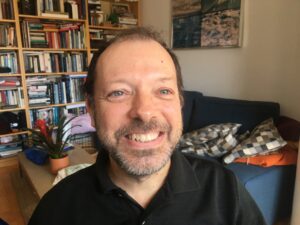Modeling the human body is certainly one of the most extraordinary applications of computational simulation. We talked about this with Mariano Vázquez, a PhD in Physics, currently CTO/CSO at ELEM Biotech, a spinoff company of the Barcelona Supercomputing Center (BSC), in which he is also researcher. The first question, of course, is about the super computing center in which he works which is one of the largest in Europe.
“Our company, ELEM Biotech, is a spinoff from the Barcelona Supercomputing Center, which is a very large super computing facility, one of the largest in Europe. BSC is a center with about 600 researchers. This large computer is very good for solving complex problems, but, in order to leverage all its power, the most important thing we need is a very efficient simulation code. So, we developed a code, which is called ALYA and predicts the behavior of nature. It is based on plenty of algorithms that are able to predict nature behavior. I am passionate about my job because we have found a way of recreating nature in a computer. The code can solve very complex problems. At ELEM Biotech we are focusing on the vertical of biomedical applications. So, the universe that we try to recreate and reproduce is the human body and this is something amazing”.
It truly is amazing. Let’s learn more about what Mariano Vázquez is currently working on. “The startup is focusing on cardiovascular research and cardiovascular applications. My background as a physicist helps me to interpret nature as a given set of equations. With these equations we can model nature no matter what the problem is and have an abstraction of the problem. So, from my point of view, blood and air are the same set of equations. I use the same code for simulating the air around an aircraft, the air that you breathe, and the blood that flows in your veins and arteries We are currently working on cardiovascular applications, specifically in cardiac resynchronization therapies, in which you have the full heart that is beating. So we model electrophysiology, mechanical contractions and flow inside the cavities of the human heart. We work close on the respiratory system simulating the air that gets into your lungs, and how the particles can be transported inside your body”.
In silico medicine is a real passion for Mariano Vázquez, since it is the best way to recreate the human body in a computer. “First of all, in silico medicine helps us understand how the bodies of healthy people work. Secondly, we can study how a disease changes people’s lives and what are the consequences of that disease on the human body. Thirdly, to study the best treatments in order to improve the quality of life of the sick people”.
This is indeed very fascinating: what happens, for instance, if a person with a pacemaker is taking a drug for COVID19? What is really amazing is the possibility to simulate any condition of the human body. It is a fantastic field for doing research.
According to the interview with Prof. Mariano – Modeling & Simulation can be more than a game changer in medicine. “I think it can be the next revolution. Right now we are in a revolution that it is based on data analysis and machine learning. Modeling & Simulation is the future, but it has already started. In many other technology fields like astronomy, automotive, oil and gas, energy, computer-based Modeling & Simulation and super computer based Modeling & Simulation have become the core business. What we still need in healthcare is to increase the confidence of the users.
Modeling & Simulation in biomedical is different. We have to go through a statistical validation. We run many simulations, we change parameters, and we see at what extent these variabilities can bring to a solution within certain bounds. Also, the more scientists work with simulation tool, the higher the confidence that the users can have. This will be beneficial for everyone”.
Last but not least, what is the main challenge that the healthcare industry is facing today? “I think that aging is the most challenging issue at the moment. The number of people is increasing on our planet and so is the number of old people: new diseases that are appearing, that’s why drugs and medical devices must be completely different. So aging is a very challenging issue that will make things much more complex. This problem is also related to our own business, because, as the problems get larger, we will need more and more challenging simulations to be performed”.
